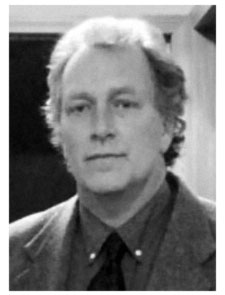
A book of Shakespeare’s plays. (Duncan Walker/iStockphoto) Below: Rex Hammond. (Portrait courtesy Hammond)
What happens when an armed robber reads Shakespeare?
 Rex Hammond first took a class with Laura Bates, PhD’98, in 1999. At the time he was incarcerated at Wabash Valley Correctional Facility in Carlisle, Indiana, serving 25 years for armed robbery.
Rex Hammond first took a class with Laura Bates, PhD’98, in 1999. At the time he was incarcerated at Wabash Valley Correctional Facility in Carlisle, Indiana, serving 25 years for armed robbery.
Hammond took three literature classes from Bates—author of Shakespeare Saved My Life: Ten Years In Solitary with the Bard (Sourcebooks, 2013)—while earning an associate’s degree in general studies from Indiana State University. Released in 2009, Hammond completed his bachelor’s degree in criminal justice and then earned a master’s in criminology and criminal justice from ISU. Next month Hammond begins a PhD program at Washington State University.
What was it like leaving prison after 25 years? Did you immediately enroll at ISU?
No. It’s been a long and winding road.
I got released on August 31, 2009. I went to a homeless shelter, spent seven months there. First job was at McDonald’s, flipping hamburgers for minimum wage. Finally I was able to get my own apartment. It took me about a year and a half to get a car.
My brother committed suicide, and I went through some suicide stuff myself. I finally went back to school in August 2012 for a bachelor’s of science degree in criminology and criminal justice.
Why criminal justice?
It’s been my whole life. My first run-in with the law was when I was nine years old. I first got locked up when I was 14, again as a juvenile when I was 16, then as an adult when I was 19, and I spent the next 25 out of 26 years in prison. All for violent crimes. I took a deputy hostage when I was 19. The rest were all armed robberies.
And you think the Shakespeare class helped turn your life around?
At the time, yes. Do I study Shakespeare now? No. It was a stepping stone for me.
In Shakespeare you see good people make bad choices. Of course me and the rest of the inmates and convicts, I wouldn’t label all of us bad people because a lot of us had good hearts. We had just made a lot of bad choices.
In prison you have what’s called the inmate code. It’s no different than the code of the streets. Honor and respect and revenge. If you’re disrespected, you have to ... That’s what you live by in prison.
But Shakespeare kind of gives you the idea that there is no honor in that. There’s more honor in, I won’t say turning the other cheek, but being able to let things go. Not always having to seek revenge.
Did you find the language difficult?
I never thought I’d read Shakespeare. Before getting to college, I’d maybe read 10 books in my life. Just being able to read and comprehend and talk about it, that did a lot for my psyche.
Once you read one of his plays, it carries over into his other plays. You’re more apt to be able to understand those.
What was Laura Bates like as a teacher?
She’s got a very demanding, very hard style. I remember asking Dr. Bates this in prison: Do you dummy this stuff down ’cause you think we’re inmates and we can’t understand it? She said no, she actually made it harder.
She’s got a motherly presence about her. She was the one professor who would come to the area of prison where we lived. She had that kind of respect in prison.
There’s just something about her. She grew up on the streets of Chicago. Her first boyfriend died during a drug deal gone bad. She grew up poor. Her parents were first-generation immigrants. She says in the book that the main thing that separated her and Larry [Newton, one of her best students, serving a life sentence without parole] was that she had loving parents to come home to, and Larry didn’t.
When she teaches, it’s like an art. You have professors that are just professors that teach, and you have professors that treat it like an art.
Was it hard to focus on academic work in a prison environment?
I used art and college and writing as a mental gateway to escape. Sort of like Old Man and the Sea, where he’s laying in the boat and he just fixes his eye on a star, to transcend out of there. In prison I used all that as a getaway. Out here, I want to be part of the world. It’s harder for me to concentrate on my artwork. I don’t read as much as when I was on the inside.
I saw the ocean for the first time just last weekend. The Outer Banks in North Carolina. I liked it. But I don’t usually go anywhere. I go to college and then I go home. The two places I feel most comfortable in the world are prison and college campus.
You find them similar?
Actually I do. I tell professors, students aren’t any different from inmates. In prison you had students who joined the CEP [Corrections Education Program] because they wanted that degree to get a time cut. A two-year cut for the associate’s degree, a four-year cut for the bachelor’s degree. I wanted to learn something, but did I want the time cut? Yes.
Students out here are no different. They’re there just to get a degree, because Mom and Dad want them to, because they want a better-paying job. They’re not there to learn anything.
You gave a talk about Laura Bates’s work at the Midwestern Criminal Justice Association Conference last fall. What did you say?
I study emotional intelligence. That’s what my thesis is all about. A lot of inmates react from very poor emotional control.
What I hypothesized at the MCJA was that Dr. Bates, working with these violent offenders that were all in the SHU [security housing unit, i.e., solitary confinement], it gave them a chance to change the way they think. They’d always reacted from their limbic system, the emotional part of the brain. They never used their critical thinking or frontal lobes, but Shakespeare made them do that.
Our brains, all the time, are forming new neural connections. I think over the extended period of a year when we studied Shakespeare, we were able to change the way we think, then we changed our reactions. I would love to take that group and run an fMRI scan on their brains, before and two years after.
Most prisoners are good-hearted people. They don’t want to be where they’re at. Most prisoners dream. I dreamed of getting out, getting a job, finding a woman, maybe having a kid. The house in the country. Then they get out and get mixed up in the world, and it goes haywire.
The question I ask myself too, if I had had that experience with Dr. Bates 10 years prior, would that have changed me then? I don’t know. Nobody knows.
Do you ever worry that you might make another bad decision?
No. The first few years, yeah. But I’ve been out five-and-a-half years. So I don’t. Even though I get discouraged.
What’s your favorite Shakespeare play?
Macbeth or Othello. In prison—I’ve never seen anything like it out here, but race is such a big issue. And race takes place in Othello.
Has your experience in prison influenced your academic work?
I get on professors all the time. You guys don’t know jack shit about the criminal. You do all these studies. You don’t know anything about what motivates a criminal. You’re worried about all these freaking numbers.
I’ve been at ISU two-and-a-half years, and I’ve had one criminology professor sit down and pick my brain. I thought, wow. I did 25 years in prison. Twenty-seven years of my life incarcerated, with two years of juvenile. And you have nothing to ask me?
Do you have any advice for parents who want to make sure their kids stay out of the criminal justice system?
Did you see that New York Times story on Greg Ousley? He was locked up when he was 14 for murdering his parents. I was next to him at Wabash when he was 17. He played guitar with the Shakespeare in prison program.
Me and my dad were always fighting. I don’t ever remember playing any kind of ball with him. He never came to any of my sports games. Mom came to very few. I never had a connection, really, with either of my parents, other than being in the same house with them.
I’m just glad that I never had the suicide and murder thoughts like Greg did. If we’d had a gun in the house, somebody would have died. That’s how bad we fought. I still show some signs of low emotional intelligence. I’m a lot better than I used to be.
My dad was a good provider, don’t get me wrong. But you were stoic, you didn’t give your sons a hug. That would be my bottom line with parents. Try to be tender to your child’s emotional part.
